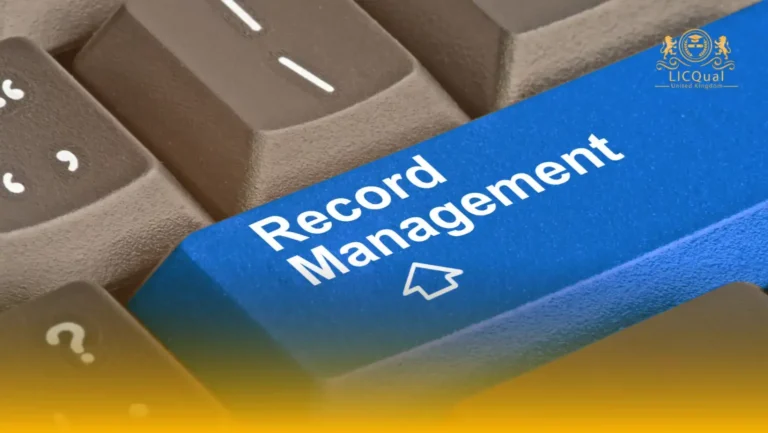The LICQual Level 3 Diploma in Food Science and Nutrition (Dip Food Science and Nutrition) is a comprehensive qualification designed for learners seeking to advance their careers in the fields of food science, nutrition, and related health professions. This diploma equips learners with in-depth knowledge of nutritional science, food composition, dietary requirements, and food safety principles, enabling them to make informed decisions in both professional and personal contexts.
Ideal for professionals working in healthcare, food production, dietetics, public health, and wellness sectors, this diploma helps learners enhance their expertise, broaden their knowledge base, and achieve meaningful professional development. It is particularly suited for those aiming to strengthen their skills in nutritional assessment, meal planning, dietary analysis, and scientific evaluation of food products, while aligning with the latest evidence-based practices in nutrition science.
LICQual ensures that all centres delivering this diploma maintain the highest standards of training. Centres must have qualified and competent staff, alongside access to the essential materials, resources, and facilities required for effective learning. This commitment guarantees that learners receive practical, engaging, and high-quality education, supporting their success throughout the programme.
By completing this diploma, learners not only gain a recognised qualification but also enhance their Continuing Professional Development (CPD), opening opportunities for career progression and increased professional credibility. The programme is structured to provide a balance of theoretical knowledge and practical skills, empowering learners to apply their learning confidently in professional settings.
Course Overview
Qualification Title
LICQual Level 3 Diploma in Food Science and Nutrition (Dip Food Science and Nutrition)
Total Units
6
Total Credits
60
GLH
240
Qualification #
LICQ2201038
Qualification Specification
To enroll in the LICQual Level 3 Diploma in Food Science and Nutrition (Dip Food Science and Nutrition), applicants must meet the following criteria:
|
Qualification# |
Unit Title |
Credits |
GLH |
|---|---|---|---|
|
LICQ2201038-1 |
Fundamentals of Food Science |
10 |
40 |
|
LICQ2201038-2 |
Human Nutrition and Dietary Requirements |
10 |
40 |
|
LICQ2201038-3 |
Food Safety, Hygiene, and Quality Assurance |
10 |
40 |
|
LICQ2201038-4 |
Nutrition and Public Health |
10 |
40 |
|
LICQ2201038-5 |
Food Science Research and Analysis |
10 |
40 |
|
LICQ2201038-6 |
Practical Applications of Food Science and Nutrition |
10 |
40 |
By the end of this course, learners will be able to:
Unit 1: Fundamentals of Food Science
By the end of this unit, the learner will be able to:
- Explain the principles of food science, including the composition and chemical properties of foods
- Identify the role of macronutrients and micronutrients in human health
- Analyse the nutritional value of various food products
- Describe factors that influence food quality, stability, and shelf-life
Unit 2: Human Nutrition and Dietary Requirements
By the end of this unit, the learner will be able to:
- Explain nutritional requirements across different life stages and populations
- Assess dietary intake using standard nutritional assessment techniques
- Identify the components of a balanced diet and dietary reference values
- Evaluate nutritional needs in relation to health conditions and lifestyle factors
Unit 3: Food Safety, Hygiene, and Quality Assurance
By the end of this unit, the learner will be able to:
- Explain key food safety legislation and hygiene regulations
- Implement best practices for food handling, storage, and preparation
- Identify potential hazards in food production and implement risk mitigation strategies
- Evaluate quality assurance systems and their role in maintaining food safety standards
Unit 4: Nutrition and Public Health
By the end of this unit, the learner will be able to:
- Explain the link between nutrition and public health outcomes
- Analyse strategies for preventing diet-related diseases
- Evaluate public health policies and nutrition interventions
- Apply knowledge of nutrition to promote health within communities
Unit 5: Food Science Research and Analysis
By the end of this unit, the learner will be able to:
- Explain research methods relevant to food science and nutrition
- Collect, analyse, and interpret data from scientific studies
- Evaluate evidence-based research to inform professional practice
- Apply critical thinking to assess the validity and reliability of nutritional information
Unit 6: Practical Applications of Food Science and Nutrition
By the end of this unit, the learner will be able to:
- Apply theoretical knowledge to plan and analyse balanced meals
- Conduct dietary analysis and provide nutrition recommendations
- Develop food products or interventions based on nutritional principles
- Demonstrate professional practice in applying nutrition science to real-world scenarios
The LICQual Level 3 Diploma in Food Science and Nutrition (Dip Food Science and Nutrition) is designed for learners who want to build expertise in food science, dietetics, and nutrition education. This internationally recognized diploma is ideal for healthcare professionals, educators, students, and community leaders who aim to promote healthier lifestyles and improve public health outcomes. The Diploma in Food Science and Nutrition online offers flexibility, affordability, and global accreditation, making it suitable for professionals and learners worldwide.
1. Healthcare Professionals
- Doctors, nurses, and allied health staff seeking advanced nutrition knowledge
- Public health workers aiming to manage food and nutrition programs
- Hospital staff interested in accredited food science and nutrition qualifications
- Professionals looking for a Level 3 food science and nutrition course
- Those wanting globally recognized certification in healthcare nutrition
2. Dietitians and Nutrition Experts
- Practicing dietitians aiming to expand into food science and research
- Nutritionists seeking accredited training in food science and dietetics
- Professionals wanting to design and oversee nutrition programs in hospitals or clinics
- Individuals looking for a diploma in food science and nutrition online
- Those aiming to strengthen their career profile with international accreditation
3. Educators and Academic Trainers
- Teachers delivering nutrition and food science education in schools or universities
- Trainers developing community nutrition and wellness programs
- Educators seeking Dip Food Science and Nutrition qualification for credibility
- Professionals wanting to integrate food science into curriculum design
- Those aiming to inspire healthier lifestyles through education
4. NGO and Community Health Workers
- Staff working in NGOs focused on public health and nutrition
- Community leaders promoting food safety and wellness initiatives
- Workers addressing malnutrition and dietary challenges in underserved areas
- Professionals seeking accredited training in food science and nutrition
- Those aiming to design impactful nutrition and health projects
5. Wellness and Fitness Professionals
- Fitness trainers expanding into food science and nutrition education
- Wellness consultants seeking a diploma in food science and nutrition
- Professionals offering diet planning and lifestyle coaching with scientific knowledge
- Individuals wanting internationally recognized certification in food science
- Those aiming to combine fitness expertise with nutrition education
6. Career Changers and Lifelong Learners
- Individuals exploring new opportunities in healthcare and food science
- Professionals from other fields seeking a career in nutrition and wellness
- Learners interested in flexible online diploma programs
- Those motivated to gain practical skills in food science and dietetics
- People passionate about making a difference in community health
7. International Students and Global Learners
- Students seeking globally recognized food science and nutrition qualifications
- Learners aiming for career opportunities across different countries
- Professionals looking for affordable, accredited online diplomas
- Individuals preparing for international healthcare and education roles
- Those wanting a diploma that meets global standards in food science and nutrition
To deliver the LICQual Level 3 Diploma in Food Science and Nutrition effectively, centres must meet the following requirements:
- Qualified and Competent Staff: All teaching and assessment personnel must hold relevant qualifications and demonstrate expertise in food science, nutrition, or related fields.
- Appropriate Learning Resources: Centres must provide access to up-to-date textbooks, scientific journals, digital learning materials, and practical equipment for effective teaching and learning.
- Facilities for Practical Learning: Centres should have suitable kitchens, laboratories, or simulation spaces to allow learners to apply theoretical knowledge in real-world contexts.
- Assessment Support: Centres must have systems in place for conducting assessments, monitoring learner progress, and providing constructive feedback in line with LICQual standards.
- Health and Safety Compliance: All learning environments must adhere to local health and safety regulations, ensuring safe participation for all learners.
- Commitment to Quality Assurance: Centres must implement robust quality assurance processes to maintain high standards of teaching, learning, and assessment.
- Support for Learners: Centres should provide guidance and support to learners, including access to additional learning resources, mentorship, and assistance with CPD.
These requirements ensure that learners receive high-quality, professional, and internationally-standardised training, equipping them with the skills and knowledge needed for success in the food science and nutrition sectors.
Assessment and Verification
All units within this qualification are subject to internal assessment by the approved centre and external verification by LICQual. The qualification follows a criterion-referenced assessment approach, ensuring that learners meet all specified learning outcomes.
To achieve a ‘Pass’ in any unit, learners must provide valid, sufficient, and authentic evidence demonstrating their attainment of all learning outcomes and compliance with the prescribed assessment criteria. The Assessor is responsible for evaluating the evidence and determining whether the learner has successfully met the required standards.
Assessors must maintain a clear and comprehensive audit trail, documenting the basis for their assessment decisions to ensure transparency, consistency, and compliance with quality assurance requirements.







